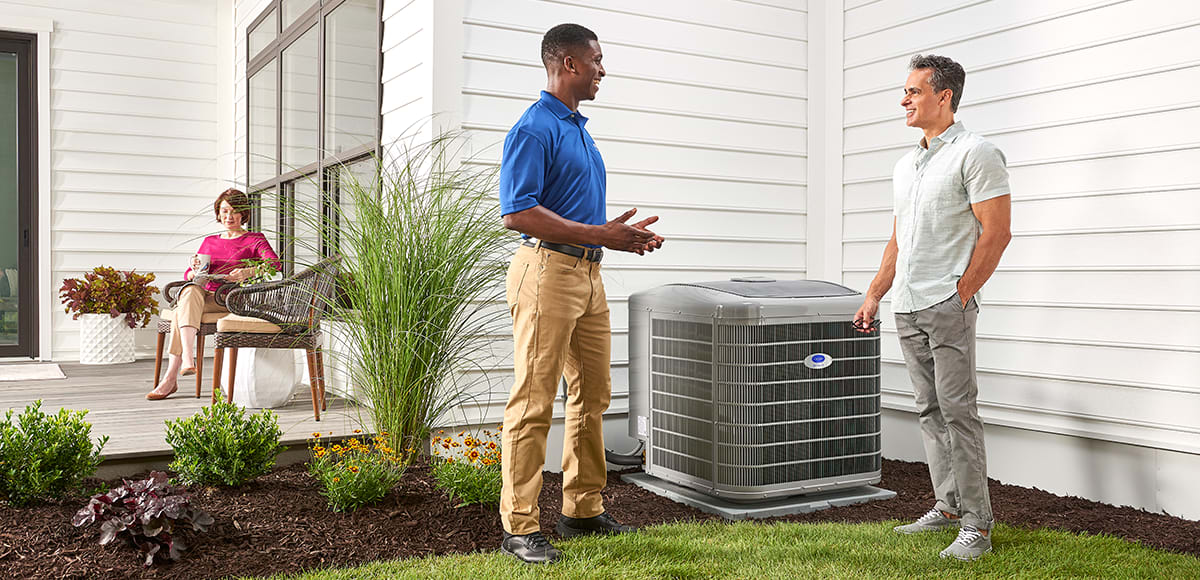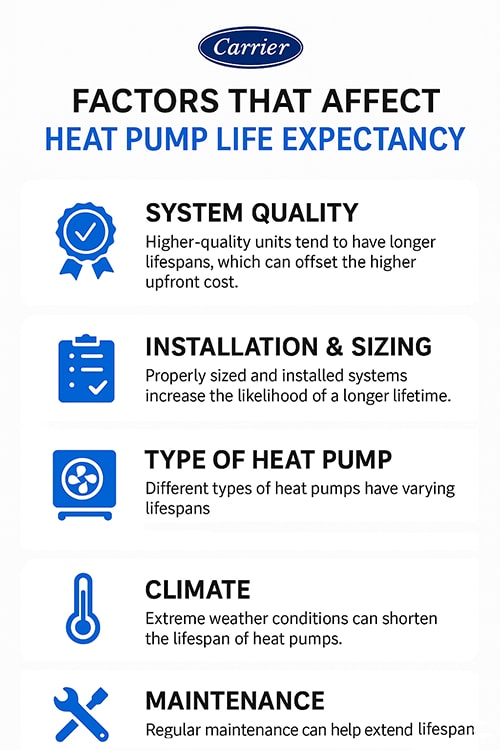About The Author: Travis Baugh is a Digital Brand Marketing Manager for Carrier, where he develops informative, straightforward content to help homeowners better understand heating, cooling, and indoor air quality. His writing is focused on empowering homeowners to make confident, well-informed choices about their home comfort systems.
How Long Do Heat Pumps Last
A typical heat pump lasts 10–15 years, with well-maintained systems sometimes reaching 20 years. Lifespan can vary based on installation quality, regular maintenance, climate, and usage patterns. This guide will quickly cover the key factors that affect longevity, practical maintenance tips, and when it may be time to repair or replace your system. Learn more about the latest heat pump technology for your home’s HVAC systems.
For personalized guidance, connect with a local dealer to evaluate your home and system options.
The Average Heat Pump Lifespan
Most heat pump systems last between 10 and 15 years, with the potential to reach 15 years or more with proper care. Homeowners can typically expect major repairs to become more likely after about a decade, while most manufacturer warranties cover key components for the first 5–10 years. Regular maintenance—such as filter changes, coil cleaning, and annual professional tune-ups—can help extend your system toward the upper end of its lifespan, though actual longevity varies years depending on climate, usage, and installation quality.

Factors That Affect Heat Pump Life Expectancy
The lifespan of a heat pump can vary significantly based on several factors, including the quality of the system, installation and sizing, and the type of heat pump. Understanding these factors helps homeowners make informed decisions that maximize performance and longevity.
- System Quality: Higher quality heat pump systems generally last longer and provide better reliability over time. For example, premium models can reach 15–20 years, while lower-tier systems may only last 8–12 years, making the initial investment more cost-effective over the long term.
- Installation & Sizing: Proper heat pump installation and correctly sized equipment are critical for longevity. A properly installed system can last 12–15 years, whereas an undersized or oversized unit, or one installed incorrectly, may experience stress and wear that shortens its life to 8–10 years.
- Type of Heat Pump: Different heat pump types have varying lifespans. For instance, air-source heat pumps typically last 10–15 years, while geothermal heat pumps can exceed 20 years, due to fewer exposed components and more stable operating conditions.
- Climate: The local climate can significantly impact a heat pump’s lifespan. In cold climates, the system must run longer and work harder to heat the home, which puts more stress on components and can shorten life expectancy, while in hot climates, prolonged cooling cycles can overwork the system if it struggles to release heat efficiently.
- Usage: How a heat pump is used affects its longevity. Frequent start-stop cycles, continuous heavy operation, or inefficient thermostat settings can increase wear on components and shorten the system’s lifespan.
- Maintenance: Regular heat pump maintenance is the single most important factor in extending a heat pump’s life. Homeowners should schedule annual professional tune-ups and routinely clean or replace filters to keep the system running efficiently and reduce long-term wear.
5 Ways to Extend Your Heat Pump Life Expectancy
Following a few simple steps can help extend the expectancy of a heat pump and ensure it continues providing reliable, efficient comfort for years. Carrier recommends every homeowner practice regular maintenance and smart usage habits to protect their investment and avoid premature wear. For detailed guidance, see our full heat pump maintenance resources.
1. Schedule Annual Maintenance
Regular heat pump maintenance includes a thorough system inspection, coil cleaning, electrical and refrigerant checks, and airflow verification. Performing these tasks annually helps catch minor issues before they escalate, ensures the system runs efficiently, and significantly extends the unit’s lifespan.
2. Keep Your Unit Clean
Before performing any cleaning, ensure your heating and cooling system is powered off. Clear at least 2–3 feet around the outdoor unit, remove debris, leaves, and dirt, and gently clean the fins and surfaces without using a pressure washer. Keeping the unit clean helps maintain airflow and efficiency, reducing strain and prolonging its lifespan.
3. Change Filters Regularly
Replacing the air filter on a regular schedule—typically every 1–3 months depending on usage—ensures proper airflow and reduces wear on the system. Always use the correct size and MERV rating recommended by the manufacturer to maintain efficiency and protect key components, which extends the unit’s life.
4. Address Problems Quickly
Act promptly when your heat pumps show early warning signs, such as unusual noises or odors, short cycling, ice buildup, weak airflow, error codes, or rising energy bills. Addressing problems early prevents minor issues from escalating into major failures, helping preserve system performance and longevity.
5. Protect the Unit
Provide shelter for your outdoor air conditioner or heat pump from extreme weather conditions like heavy rain, snow, or direct sun exposure. Protecting the unit reduces stress on components, prevents corrosion, and contributes to a longer, more reliable lifespan.

Signs It's Time to Replace Your Heat Pump
Homeowners should watch for several key indicators that it may be time to replace their heat pump. Recognizing these signs early can help maintain comfort, efficiency, and avoid unexpected breakdowns.
- Rising energy bills – A noticeable increase in your energy bill without a change in usage or weather can signal declining system efficiency. Significant, sustained spikes are a warning that the heat pump may be struggling to perform.
- Frequent repairs – If your system requires frequent repairs to operate properly, it may be more cost-effective to replace it rather than continually fixing old components. Learn more about professional heat pump repair.
- Inconsistent temperatures – Rooms that are too hot or too cold, or a system that struggles to maintain a steady temperature, indicate the unit may be losing capacity and could need replacement.
- Loud operation – Unusual noises like rattling, banging, or grinding can suggest worn or failing components. If these sounds persist or worsen, it may be a sign the heat pump is nearing the end of its useful life.
- Old age – Most heat pumps need replacement between 10–15 years, while higher-quality, well-maintained units can last up to 20 years or slightly more.
If you notice any of these warning signs, it’s a good idea to contact a local Carrier dealer for an assessment. Connect with a local dealer to evaluate your system and discuss replacement options.
Connect With a Carrier Dealer
When it’s time to replace your heat pump or schedule routine maintenance, working with a trusted HVAC contractor ensures a safe, efficient, and properly sized system for your home. Carrier dealers are factory-trained, use genuine parts, and provide expert guidance to help you choose the right solution. Contact a Carrier dealer today to schedule an assessment or get a personalized quote.
FAQs About Heat Pump Longevity
Properly installed, sized, and regularly maintained heat pumps are generally reliable and should not experience frequent breakdowns. Most issues occur due to lack of maintenance, improper installation, or extreme conditions.
Nationally, heat pump replacement costs generally range from $6,000 to $25,000, depending on factors such as home size, climate, efficiency rating, ductwork, and installation complexity. Learn more about typical heat pump costs.
Deciding whether to repair or replace depends on age, frequency of issues, and repair costs. A common guideline is the “50% rule”—if repair costs exceed 50% of the cost of a new system, replacement may be more cost-effective. For professional service, see our heat pump repair resources.
Yes, gradually. Wear on components, dirty coils or filters, and refrigerant or airflow issues can reduce efficiency over time. Annual maintenance helps slow this decline, and newer high-efficiency models can provide meaningful energy savings when it’s time for replacement.
Heat pumps typically require annual professional servicing to ensure optimal performance, though homeowners should also follow any guidance in the manufacturer’s manual for additional checks or seasonal maintenance.

